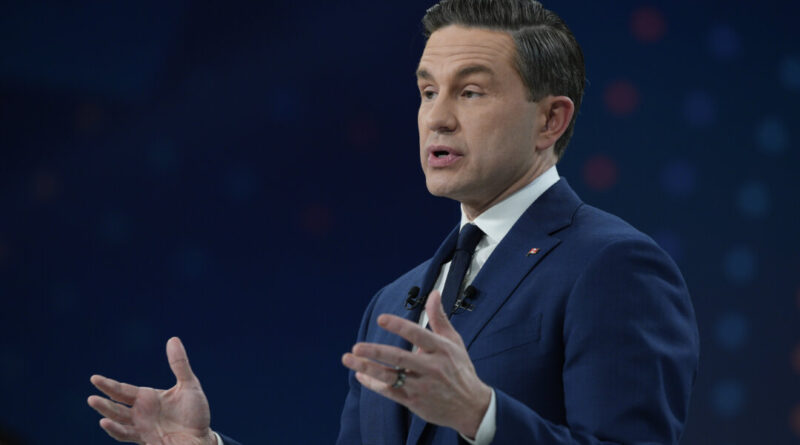5 Key Points From the Conservatives’ Fully Budgeted Election Plan
Conservative Leader Pierre Poilievre introduced his platform on April 22 as one that would “restore” Canada’s promise by lowering costs and crime, increasing the country’s per capita GDP. Poilievre said his government would cut spending on bureaucracy, consultants, and foreign aid, while boosting economic growth through expanded resource production.
Here are five takeaways from the platform.
Reducing the Deficit by 70 Percent, With an Asterisk
Poilievre, who has long criticized increasing government debt, has attempted to put fiscal responsibility at the core of his costed platform. The Conservatives say under their plan, Canada’s deficit would drop from the Parliamentary Budget Office’s projected $46.8 billion deficit in 2025 to $14 billion by 2028—a decline of 70 percent.
The Tories do not provide a plan for when they would balance the budget. The Conservatives’ plan would also still run a $100 billion deficit over the next four years, but this is smaller than Mark Carney’s projected $130 billion deficit over that time period.
The Conservatives say their key measures will boost production and thus increase government revenue in taxes to offset expenses. The party says this includes $12.8 billion generated from the additional homes its plan would see built, $11.2 billion from the auto sector after the Liberal government’s electric vehicle mandate is removed, $5 billion from the oil and gas sector after scrapping the emissions cap, and $2 billion after removing the Clean Fuel Regulations.
Carney said that the Conservatives’ platform is using “phantom numbers” to make its accounting look better than it actually is. Carney also told reporters that if his party used the same assumptions in its budget, then Ottawa would have a fiscal surplus by 2030.
Axing of Taxes
Poilievre had previously made “Axe The Tax” a prominent political slogan, in reference to his party’s commitment to get rid of the Liberal government’s carbon tax, thereby decreasing the cost of food, fuel, and heating. But they stopped using the slogan after Carney reduced the consumer carbon tax rate to zero as his first act as prime minister.
Poilievre’s platform still says a Conservative government would axe the carbon tax “in full,” which includes the federal industrial carbon tax backstop that Carney has kept. But his party plans to take a hatchet to other taxes as well.
As previously announced, the Conservatives would cut the lowest personal income tax rate from 15 percent to 12.75 percent, while also getting rid of the capital gains tax hike and taxes on reinvestment in Canada. These three measures would cost a combined $55.5 billion over the next four years. Liberals have also pledged to bring down taxes for the lowest income bracket by 1 percent and to cancel the capital gains tax hike.
Also on the chopping block would be the GST on all new homes that cost less than $1.3 million. The Liberals have also said they would remove the GST for homes up to $1 million for first-time homebuyers.
In an effort to woo Canadians concerned with ever-increasing taxes, the Conservatives would also introduce the Taxpayer Protection Act. This would ban the introduction of new or higher federal taxes without Canadians first voting in favor of them in a referendum.
The Conservatives would also get rid of the escalator tax on alcohol; the planned food packaging tax on fresh produce that could raise costs by up to 30 percent; and the Underused Housing Tax, applying to vacant or underused housing, which the platform says “costs more to administer than is collected in taxes.”
More Energy Production and Building Infrastructure
Poilievre’s platform argues that over the last 10 years, Canada’s economy has been “strangled” by government red tape, particularly when it comes to energy projects like pipelines and liquid natural gas terminals. Poilievre has also said Liberal policies have sent billions of dollars of investment to the United States.
The platform says the Conservatives would get rid of the Impact Assessment Act, which puts additional federal regulatory requirements on major projects such as pipelines and which Tories say in effect makes new major projects impossible for investors. Carney has said he would keep the legislation but streamline approval of major projects. The Tories also say they would remove the ban on oil tankers from operating off the coast of B.C., to allow more markets for Canadian oil and gas resources.
The Conservatives have also promised to create a National Energy Corridor to rapidly approve and build critical infrastructure. The party says this would fast-track approvals for projects like transmission lines, pipelines, and railways.
The Conservatives would also get rid of the Liberals’ cap on oil and gas production, plan to double oil production in Newfoundland and Labrador, fast-track B.C.’s LNG Canada Phase 2 and the GNL Quebec LNG projects, and expand the Port of Churchill in northern Manitoba to extend the shipping season.
Cutting Consultants, Foreign Aid
Liberals have often accused Poilievre of wanting to perform deep cuts to social programs as he seeks to reduce the deficit. On the campaign trail, the Tory leader said he wouldn’t touch programs such as dental care and pharmacare, which were born of the alliance between the minority Liberals and the NDP during the last session of Parliament.
…(Remaining content not shown for brevity)…





